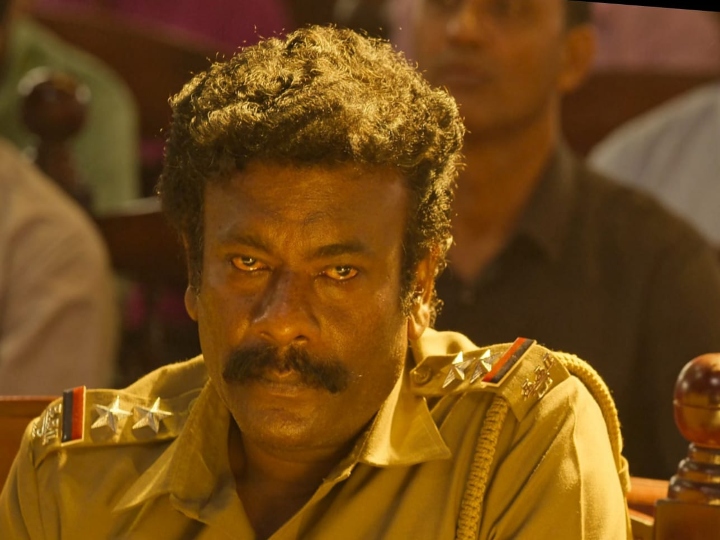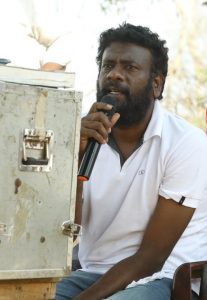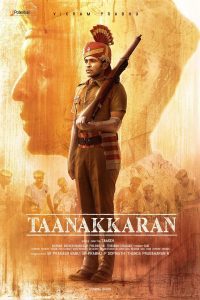
Cop as filmmaker: Director Tamizh recounts his 'Taanakkaran' experience
The policeman-turned-film director talks to The Federal about transforming his true-life experiences into celluloid

Tamil cinema has traditionally glorified policemen, depicting them as “encounter specialists” who will go to any extent to deliver justice. But recent movies such as Visaranai (2015), Jai Bhim (2021) and Writer (2021) have explored the grey side of police authorities.
Visaranai deals with the lives of two men before and after they are thrown into a kafkaesque scenario in which they are tortured into making confessions. Jai Bhim shows how brutal the police can be. Writer deals with the subject of whistleblowing.
Now, the newly released Taanakkaran has joined this list. Released on OTT on April 8, it critiques the police system through a sober story set in a training camp. Starring Vikram Prabhu, Lal and MS Bhaskar in the lead roles, Taanakkaran depicts the way police candidates are selected, how they are treated by their trainers, and how this treatment brutalises them.
The film marks the directorial debut of actor Tamizh, who had played bad cop Gurumurthy in Jai Bhim. Interesting, before stepping into tinseltown, Tamizh served as a police constable for 12 years. The Federal spoke to him about the film, his characters and future projects. Excerpts:
Let’s begin with the title of the film…
‘Thana’ is a Marathi word that means checkpost or police station. When the British started to recruit Indians into the police service following the 1857 revolt, they called the policemen ‘thanas’. Even today, in many North Indian states, one can find ‘Thana Lane’. I begin the story by explaining how the Indian police force came into existence. So I thought it would be better if we title the film ‘Taanakkaran’. When I was working on the script, I came to know that even in Tamil Nadu, during the Independence struggle, policemen were called ‘taanakkaran’.
You played the bad cop in Jai Bhim. With this film, you have proved your mettle as a filmmaker. Police stories seem to chase you…
(Laughs) That’s true. But not only that. I was assistant director on Visaranai. It was my first film and it was also based on a real-life police story. In the upcoming film Viduthalai, directed by Vetri Maran, I again sport a khaki uniform. Many people think that my first film as an actor was Jai Bhim. But I was also in Vetri Maran’s Asuran.
I completed Taanakkaran while doing Asuran. Due to COVID restrictions, it went into hibernatation.
How did your experience as a policeman inform the script-writing?
I joined the police force as a constable. Vikram Prabhu plays a constable in the film. I went through all kinds of hardships, which I have shown in my film. Many trainees have to undergo things like ‘ED’ (punishment drill) if they do not obey their seniors.
Can you tell us how you weaved real-life incidents into this story?
The story is set in 1998. About 100 new candidates who are in their 40s also undergo training along with young trainees like Vikram Prabhu. This happened in real life, too.
At one point the hero says that in 1982, around 1,300 candidates were unable to join the police force because of the Union government’s decision to dismiss the Tamil Nadu government. In real life the dismissal of the state government happened in 1991. At that time some 1,800 candidates had been selected to the police force.

The AIADMK, which came to power in 1991, selected some 2,500 candidates in 1993. Opposing that move, those who were already waiting went to court. After the DMK came back, the waiting candidates finally got their appointments, in 1998. Of course, those candidates were now much older and their physical prowess had diminished. I joined the force in 2002. During my training, many of the seniors used to narrate their experiences. Those things nurtured my script.
You criticise the training system, which was developed by the British. What changes would you like to see?
In one scene, during a law class, a student collects money from fellow trainees and gives it to his seniors. That is nothing but a bribe. The senior officials demand such bribes to go easy on the trainees. That kind of thing still happens.
When we completed the training, one of our batch-mates said that none of the trainers had told us not to accept bribes. That made us uneasy.
I have no problems with hard physical training. But it should not veer into cruelty. Only higher officials can implement changes, but civil society should also get involved. That would make the trainees more aware about human rights.

Did this kind of behaviour have any impact on your own career?
To be frank, I was saved. I refrained from such brutality because I was exposed to the Communist movement at a young age. I resigned from the job because I was passionate about cinema. When Vetri Maran started working on Visaranai, he took me on as his assistant because I was a former policeman. So, in that way, wherever I go, my experience as a policeman comes in handy (smiles).

